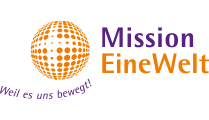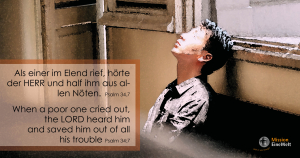Andacht – Weiter hoffen
Als einer im Elend rief, hörte der HERR und half ihm aus allen Nöten. Psalm 34,7
Wer da bittet, der empfängt; und wer da sucht, der findet; und wer da anklopft, dem wird aufgetan. Lukas 11,10
Psalm 34 ist eine wahre Schatztruhe für die christliche Tradition. Als Ganzes ist der Psalm als Beispiel für altorientalische, und speziell altisraelitische Poesie interessant und für die Bestimmung von Psalmengattungen. Auch einzelne Verse haben in verschiedenen Traditionen eine eigene Wirkung entfaltet, wie die Erwähnung von Engeln in Vers 8. Kurz gesagt, das ist ein Psalm, bei dem sich das Lesen als Bibelwissenschaftler lohnt. Aber darin erschöpft sich nicht seine Bedeutung.
Als Autor wird David genannt, und sogar der genaue Zeitpunkt in seinem Leben wird bestimmt. Aber der Psalm hat auch Bedeutung über diesen einen Augenblick hinaus. In der Zuschreibung, bei der im Übrigen ein falscher Name verwendet wird – prüfen Sie das gerne mal nach und lesen Sie dazu 1 Sam 21 – erschöpft sich nicht die Bedeutung des Psalms. Denn in dem Psalm spricht das Ich zu Gott, da gibt es das Wir, da finde ich mich unmittelbar wieder. „Einer im Elend“ das bin ich. Dagegen ist die Geschichte Davids die Geschichte eines anderen, eine fantastische Abenteuergeschichte, die man toll im Kindergottesdienst erzählen kann, die aber die Geschichte eines anderen bleibt. Die Erfahrung jedoch, die sich in Psalm 34 ausdrückt, kann jede*r machen: dass sich etwas zum Guten wendet, dass unsere Gebete erhört werden, dass Gott in dieser Welt wirkt. So erleben Menschen ihre Beziehung zu Gott seit tausenden Jahren und deshalb können auch wir darauf hoffen, dass Gott uns in unseren Nöten beisteht.
Die Bedingung dafür, Anteil an dieser Erfahrung zu haben, liefert der Psalm auch: „Lass ab vom Bösen und tue Gutes; such Frieden und jage ihm nach“ (Psalm 34,15). Also alles klar, oder? So einfach ist das oft nicht im Leben. Wir erfahren Ungerechtigkeit und Leiden, wir sehen, wie die Elenden vergeblich rufen, und fragen uns, wo denn dieser gerechte Gott in all dem sein soll. Aber sollen wir deshalb einfach aufgeben? Oder können wir nicht den Erfahrungen, unseren eigenen und denen, von denen wir gehört haben, vertrauen, wie sie in diesem Psalm ausgedrückt werden: „Der Gerechte muss viel leiden, aber aus alldem hilft ihm der Herr“ (Psalm 34,20). Auch der Lehrtext für heute ermutigt zum Weitermachen: „Wer da bittet, der empfängt; und wer da sucht, der findet; und wer da anklopft, dem wird aufgetan“ (Lukas 11,10). Von hinten gelesen bedeutet das, wer nicht bittet, der kann auch nichts empfangen, wer nicht sucht, der wird auch nichts finden und wer nicht anklopft, dem wird keine Tür geöffnet. Also weitermachen! Weiter rufen, weiter beten, weiter suchen, weiter an Türen klopfen und vor allem: weiter hoffen.
Andacht: Helen Karch
Illustration: Daniela Denk
When a poor one cried out, the LORD heard him and saved him out of all his trouble. Psalm 34.7
Everyone who asks will receive, and the one who searches finds, and the door will be opened for everyone who knocks. Luke 11.10
Psalm 34 is a real treasure chest for Christian traditions. As a whole, it is an interesting example for ancient Near Eastern, particularly ancient israelitic poetry, and for the definition of genres of psalms. Moreover, single verses have been picked up in different traditions, such as the mention of angels (Psalm 34.8). In a nutshell: it is worth to read this psalm as a biblical scholar. But therein lies not the whole meaning of the psalm.
The authorship is attributed to David and moreover to David at a specific point in his life. But the meaning of the psalm goes beyond that one moment in time. It is not in this attribution, which by the way uses a wrong name – I welcome you to check this by reading 1 Samuel 21 – wherein the whole meaning of the psalm lies. In the psalm the „me” speaks to God, there is mention of “we”, it is me, directly, that is being addressed. I am the „poor one“. In contrast to that, the story of David is the story of someone else; it is a fantastical adventure story, a great story to tell in a children’s service, almost a fairy tale, that remains, nevertheless, the story of someone else. However, the experience that is expressed in Psalm 34 is an experience that all of us might have: it is the experience that things take a turn for the better, that our prayers are being answered and that God makes a difference in our world. This is how humans have experienced their relationship with God for thousands of years and that is why we can be hopeful that God will help us in our hardships.
The conditions we need to meet so that we can partake in that experience are also given in the psalm: “Turn from evil and do good; seek peace and pursue it“ (Psalm 34.15). Well then, everything is settled, right? Things are hardly ever this clear-cut in our lives. Instead, we experience injustice and suffering, we witness how the poor man cries out in vain and we ask ourselves where this God that promises justice is in all of this. However, does this mean that we simply give up? Or do we trust in the experiences that we have made and that we heard off, such as in the psalm: „Many are the afflictions of the righteous, but the Lord delivers them out of all their troubles” (Psalm 34.20). The teaching text for today’s motto also urges us to keep going: “Everyone who asks will receive, and the one who searches finds, and the door will be opened for everyone who knocks“ (Luke 11.10). Read in reverse this means that we cannot receive if we do not ask, we cannot find anything, if we do not search and no doors will be opened if we do not knock on them. So: Keep going! Let’s keep on calling, keep on praying, keep on searching, keep on knocking on doors and above all: keep on hoping.
Prayer: Helen Karch
Illustration: Daniela Denk



 Illustration: Daniela Denk
Illustration: Daniela Denk Illustration: Daniela Denk
Illustration: Daniela Denk